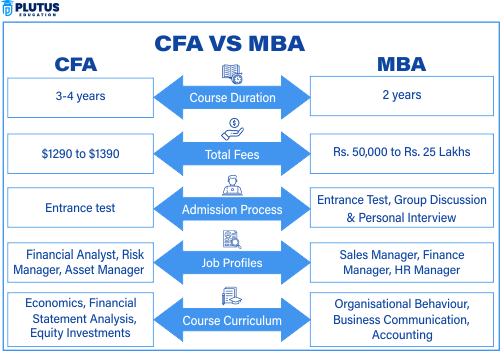The CFA designation is specialized in investment and portfolio management, while the MBA provides a more general business education with opportunities to concentrate in finance or other disciplines. For many professionals looking to make a mark in the finance sector, deciding to pursue a CFA or an MBA is a major consideration. On the one hand, Chartered Financial Analyst (CFA) certification and the Master of Business Administration (MBA) degree provide unique benefits and career prospects. Where CFA focuses on core concepts of investment management and financial analysis, MBA offers a wide range of techniques in business and management to individuals.

What is CFA (Chartered Financial Analyst)?
In layman’s terms, the Chartered Financial Analyst (CFA) is a professional title that is awarded by the CFA Institute and known across the globe. It aims to develop proficiency in investment management, portfolio evaluation, equity studies, and financial morality. The CFA course is especially sought after in asset management, equity capital markets, and investment banking corporate finance sectors, thus most suitable for individuals interested in finance and investments.
Key Features of CFA
- Core Subjects in CFA Curriculum:
- Strategies such as investment analysis, financial statement analysis, economic analysis, management of a portfolio, and financial management of corporations are among the main subjects covered.
- Ethics occupies a center stage in all three levels of the CFA program.
- Structure and Levels:
- The CFA program is divided into a tri-level structure, first consisting of level I, then level II, and lastly level III.
- Level I covers an introduction to basic concepts in finance, principles of ethics, and quantitative methods.
- Level II delves deeper into subjects like asset valuation economics and financial reporting.
- Procure degree III is directed towards the management of portfolios, the management of clients, and managing their wealth.
- Candidates have to pass all the levels in that particular order to be awarded the CFA charter.
- Skills Developed:
- Proficient in investment appraisal, asset administration, and equity investment research.
- Possess a sound appreciation of risk control and investment principles.
- Time and Cost Involvement:
- Completion of the CFA program requires between 2.5 and 4 years, depending on the readiness and the level of engagement of the candidate.
- Wherein the total expenses, such as examination costs and study materials, range from 2 lakhs to 2.4 lakhs.
Career Opportunities
- Portfolio Manager
- Equity Research Analyst
- Investment Banking Associate
- Financial Advisor
- Asset Manager
What Is an MBA? About the Degree, Programs, Jobs, and More
An MBA (Master of Business Administration) is a graduate-level degree program that provides advanced training in business management, leadership, and strategic decision-making. The MBA curriculum typically covers topics like finance, marketing, operations, human resources, and business analytics, equipping students with the skills and knowledge to excel in managerial and executive roles across various industries.
Key Features of MBA
- Specializations in MBA Programs:
- Welcome to Global Gateways, where we provide services on AAMC, FMC, and NMCC with student advice on courses such as finance, marketing, operations, human resources, entrepreneurship, and many more.
- Salaried employment courses and training structure afford a student many hours of educational and practical training together with postgraduate programs.
- Structure and Duration:
- An MBA course, on average, lasts for 1 to 2 years and can be taken on a full-time, part-time, executive, or even online basis for those pursuing distance education.
- Programs usually feature a combination of lectures, practical training sessions, internships, and final projects for practical exposure.
- Skills Developed:
- An MBA program focuses on the development of leadership, strategic, and managerial skills applicable to different business functions.
- It also develops problem-solving and teamwork skills through the use of case studies and group work.
- Admission Requirements:
- The majority of the world’s best MBA colleges demand that applicants have a certain amount of work experience, submit their CAT and GMAT scores, and possess certain academic qualifications or degrees.
- Most of the programs are also keen to provide the students with opportunities to interact with the alumni and the corporate recruiters.
Career Opportunities
- Finance Manager
- Investment Banker
- Consultant (Strategy/Management)
- Corporate Executive (CFO/CEO)
- Entrepreneur
CFA vs MBA
Given your career goals and areas of interest when making a decision, it is important to understand the difference between CFA vs MBA. Both have prospects that are worth pursuing. However, the areas of focus and skills acquired in each are quite different.
| Aspect | CFA | MBA |
| Focus Area | Investment analysis, portfolio management | Business management, leadership, strategy |
| Ideal for | Investment bankers, asset managers, analysts | Entrepreneurs, business leaders, consultants |
| Program Structure | 3 levels, self-paced | 1-2 years, structured with internships |
| Specialization | Finance, investments | Finance, marketing, operations, HR |
| Cost | 2 lakh to 2.4 lakhs | 2 lakh to 25 lakhs (depending on the school) |
| Difficulty | High, requires deep technical knowledge | Challenging, with a broader curriculum |
| Global Recognition | Strong in finance and investment industries | Strong across all business sectors |
| Networking | Limited networking opportunities | Extensive alumni and corporate connections |
| Career Path | Focused on finance-related roles | Leadership and management roles across industries |
Salary and Difficulty
While contrasting the CFA with an MBA in terms of salary and difficulty, it must be noted that both professions present great earning capacity, but the salary rates may differ by industry, region, and level of experience.
CFA vs MBA Salary
- CFA Salary
- The average pay range for CFA charterholders in India is around 7 lakh to 12 lakhs (INR), which is expected to rise considerably with growth in one’s experience.
- Taking an internship after enrollment in a CFA course and working in international portfolio management or investment banking, for example, one can make from 20 lakh-35 lakhs per year.
- MBA Salary
- Students graduating from MBA programs from highly ranked business schools are often offered jobs with starting salaries of 7 to 10 lakhs (INR) within the consulting and finance sectors in India.
- Further, MBA graduates working in management and consultative services on a global average can expect income figures between 12 lakhs and 25 lakhs per annum.
CFA vs MBA Which is Difficult?
- CFA Difficulty
- There are many reasons why the CFA program is considered one of the hardest finance certifications. First of all, it contains a very detailed and broad technical syllabus.
- Candidates are required to clear three levels of exams. The global pass rates for levels one, two, and three combined stand at approximately forty percent.
- MBA Difficulty
- Though pursuing an MBA degree is often found to be difficult, most of the difficulty is spread across several subjects such as marketing, operations, and finance, among others.
- In addition to a load of coursework and internships, free time is spent on networking for MBA students, though this is very active and practical as compared to CFA.
Conclusion
The CFA and MBA certifications provide different avenues of career progression, and a decision between the two rests on an individual’s interests and objectives. Continuing with the thought of shifting to finance, investments, and asset management, a person may consider taking the CFA route as the most appropriate alternative. These people, on the other hand, who wish to be in a position of running a corporation as an example, turning into a businessperson or a consultant, should undertake an MBA program, as such places no limits. Every such course has something to offer, as apparently there are some places where a candidate would wish to complete both the CFA and the MBA programs. In the end, deciding on why a CFA is better than an MBA should be consistent with the goals of one’s career time frame and also that industry.
CFA vs MBA FAQs
What is an MBA course?
An MBA (Master of Business Administration) course is a postgraduate degree focused on business administration, designed to equip students with advanced business skills and knowledge, typically covering areas like finance, marketing, human resources, operations, and strategy.
Is it really worth doing an MBA in India?
Whether an MBA in India is “worth it” depends on your individual goals and circumstances, but it can be a valuable investment for career advancement, leadership development, and networking opportunities, especially if you aim for senior management or leadership positions.
How do CFA and MBA differ?
Employment in finance, particularly investment management, requires a CFA, whereas an MBA is more general and tackles issues of management, strategy, and leadership.
What are the benefits of CFA and MBA together?
Yes, CFA and MBA can be done together since it will aid in acquiring financial skills and management skills as well which will enable one’s advancement in the career within a short time.
What is the duration of MBA course?
In India, a standard MBA program is typically a 2-year postgraduate degree designed to equip students with advanced business skills and knowledge
Who earns more CFA or MBA?
The two qualifications are associated with huge earnings; however, one can say that an MBA raises earning expectations more than any other advanced degree, particularly for fresh graduates and more so in consulting and management services.
What are the scholarships available for MBA students in India?
For MBA students in India, scholarships are offered by business schools (like IIMs, XLRI, ISB), the government (AICTE, state governments), and private entities (Aditya Birla Group, Ratan Tata Trust, IDFC First Bank).


